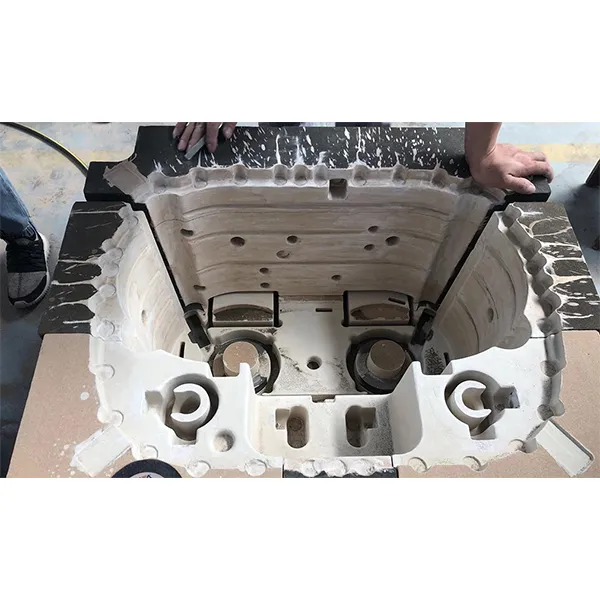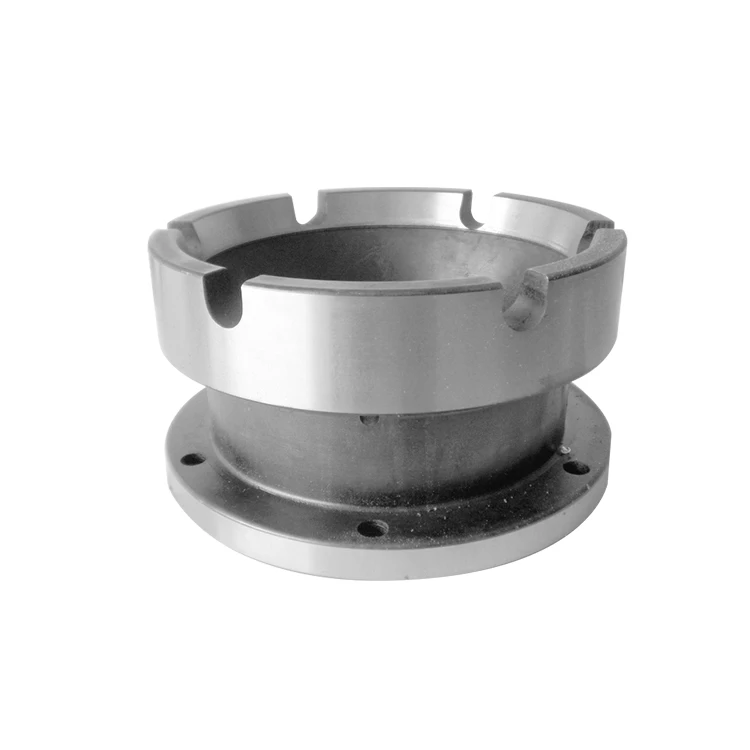The Future of Aluminum Foundries: Innovations and patterns Shaping the Industry
The light weight aluminum shop market is undergoing substantial improvement. Key trends highlight the value of sustainability and performance. Developments in clever production and automation are becoming prevalent. Foundries are increasingly concentrated on utilizing recycled products. This change raises questions about future practices and technologies. How will these modifications effect production approaches and market characteristics? The solutions may redefine the sector landscape in unexpected means.
Innovations in Smart Production Technologies
As the aluminum shop market advances, innovations in smart production innovations are ending up being increasingly crucial for improving efficiency and performance. The assimilation of automation, artificial intelligence, and the Internet of Points (IoT) is changing traditional foundry operations. These innovations make it possible for real-time monitoring of procedures, enabling immediate modifications that maximize result and lower waste.
Equipment understanding algorithms analyze manufacturing data to recognize patterns and predict upkeep requirements, reducing downtime. Robotics are progressively employed for repetitive jobs, freeing proficient workers to focus on more intricate difficulties. Furthermore, electronic doubles-- virtual versions of physical processes-- help with simulations that can improve layout and operational strategies.
The adoption of these smart production innovations is driving competitive benefits in the aluminum shop industry. By streamlining operations and improving decision-making capacities, foundries can satisfy expanding market needs while keeping high-grade standards. The future of aluminum factories is undoubtedly connected to these technical developments.
Embracing Eco-Friendly Materials and Processes
The light weight aluminum shop industry is progressively focusing on green materials and processes to boost sustainability. This shift includes the fostering of sustainable material sourcing, energy-efficient manufacturing strategies, and reliable recycling and waste administration approaches. By incorporating these techniques, foundries aim to minimize their environmental influence while maintaining competitiveness in the marketplace.
Lasting Material Sourcing
Exactly how can light weight aluminum foundries improve their sustainability initiatives? Lasting product sourcing has actually arised as an important technique in achieving this objective. By focusing on recycled light weight aluminum, foundries can considerably lower their ecological footprint, as recycled materials require much less power and fewer resources contrasted to key light weight aluminum manufacturing. In addition, sourcing materials from certified providers who adhere to green techniques advertises liable mining and decreases eco-friendly influence. Shops are likewise discovering different products, such as biopolymers and green coverings, to complement conventional aluminum procedures. Teaming up with stakeholders, including distributors and ecological companies, fosters development in sourcing techniques. Eventually, embracing sustainable product sourcing not just lines up with global sustainability goals yet likewise settings aluminum shops as leaders in ecologically accountable manufacturing.
Energy-Efficient Manufacturing Strategies
Aluminum shops are progressively taking on energy-efficient production strategies to match their lasting material sourcing campaigns. These methods concentrate on lessening energy consumption throughout the production procedure. Advanced technologies, such as induction melting and optimized spreading processes, are being applied to minimize the overall carbon impact. Additionally, automation and smart production systems enhance operational effectiveness, allowing for far better energy monitoring. Shops are likewise discovering the combination of renewable resource sources, such as solar and wind, to power their procedures. By focusing on energy performance, aluminum foundries not only lower manufacturing prices but likewise straighten themselves with global sustainability objectives, guaranteeing a more environmentally liable approach to aluminum manufacturing while meeting the climbing demand for green practices in the sector.
Recycling and Waste Monitoring
Welcoming environmentally friendly products and procedures, aluminum factories are focusing on recycling and waste administration approaches to enhance sustainability in their operations. By incorporating closed-loop systems, these centers are decreasing waste and taking full advantage of source performance. Scrap light weight aluminum, a readily available material, is being recycled on-site, considerably lowering the demand for virgin products and decreasing power intake. Advancements in arranging and processing modern technologies better assist in the recycling of light weight aluminum, making sure that also infected products can be repurposed properly. Additionally, foundries are adopting lasting techniques such as reducing contaminated materials and promoting making use of naturally degradable materials for packaging. This dedication to reusing not only lowers ecological influence but also boosts the financial feasibility of aluminum foundries in an open market.
The Duty of Automation and Robotics
Automation and robotics are significantly transforming the light weight aluminum foundry industry, considerably boosting production efficiency. By incorporating innovative technologies, foundries can lower labor expenses while all at once boosting security standards for their labor force. This shift not just enhances operations yet also places the market for lasting growth in an open market.
Boosted Production Performance
Reinventing production procedures, the combination of sophisticated robotics and automation technologies has become a keystone for light weight aluminum factories seeking enhanced effectiveness. These innovations enhance process, lower cycle times, and improve product high quality by decreasing human error. Automated systems can check assembly line in real-time, enabling immediate changes that maximize result. Furthermore, robotics assist in the handling of harmful products, ensuring more secure working atmospheres while boosting throughput. Anticipating upkeep technologies also add to efficiency by expecting devices failings, therefore reducing downtime. As a result, light weight aluminum shops can achieve greater consistency in their products while responding much more swiftly to market demands. This accept of automation is establishing a brand-new requirement for efficiency and functional quality within the market.

Lowering Labor Prices
The change towards advanced robotics and automation in aluminum foundries not only enhances manufacturing performance yet likewise plays a considerable function in decreasing labor expenses. By incorporating automated systems, shops can lessen the reliance on manual labor, which often involves high incomes and training expenditures. Robotics enhance recurring tasks such as pouring, molding, and ending up, enabling for a higher result with less personnel. This technical adjustment not just minimizes labor-related costs yet likewise enhances uniformity and quality in production. Automation can operate around the clock, optimizing operational hours without the linked expenses of overtime or change differentials. Consequently, light weight aluminum foundries can attain significant cost savings while preserving affordable rates in a progressing market landscape.
Improving Safety And Security Requirements
While conventional light weight aluminum shop procedures frequently reveal workers to hazardous settings, the combination of robotics and automation significantly improves safety requirements within the sector. Automated systems can perform high-risk jobs, such as liquified steel handling and hefty training, decreasing human direct click exposure to dangerous problems. In addition, robotics can operate in extreme temperature levels and toxic atmospheres, successfully decreasing the risk of injury. Advanced checking technologies and fabricated intelligence assurance real-time security analyses, permitting immediate responses to prospective threats. Automation simplifies operations, lowering the chance of crashes triggered by human error. Therefore, the fostering of these modern technologies not just boosts safety and security but also fosters an extra effective and efficient functioning setting in light weight aluminum factories.
Enhancing Energy Efficiency in Manufacturing
As light weight aluminum factories seek to maintain competition in an evolving market, boosting power effectiveness in production has arised as a critical focus. By adopting advanced technologies such as high-efficiency melting heaters and automated temperature level controls, foundries can especially lower energy consumption. Applying real-time surveillance systems enables accurate tracking of energy usage throughout the manufacturing process, enabling fast adjustments to enhance efficiency.
Furthermore, shifting to different energy resources, including eco-friendly options, can further reduce the carbon footprint. The combination of energy healing systems, which reclaim waste warm for reuse, is becoming increasingly common. Training personnel in energy management techniques guarantees that everyone associated with the manufacturing process bears in mind energy use.
These efforts not just reduced operational prices yet likewise align with international sustainability goals, positioning light weight aluminum foundries as accountable gamers in the industry while improving their total competitiveness. - Precision aluminum casting
Technologies in Recycling Aluminum
Innovations in recycling light weight aluminum have actually gained momentum together with initiatives to enhance energy effectiveness in production. The light weight aluminum market has actually embraced innovative innovations that enhance the reusing procedure, decreasing power intake and environmental effect. Methods such as hydrometallurgy and new sorting innovations boost the removal of light weight aluminum from scrap, boosting yield rates and guaranteeing better recycled material.
The advancement of closed-loop recycling systems enables foundries to reuse aluminum without significant degradation in top quality, making the procedure a lot more lasting. Advancements in logistics and collection, including boosted radar and automated sorting, have also played a vital role in increasing the performance of light weight aluminum healing. These developments not just add to a round economic climate however also aid alleviate the carbon footprint related to light weight aluminum production. As the demand for lasting methods grows, these innovations place the aluminum shop market as a leader in responsible source monitoring.
Replying To Market Needs and Consumer Trends
Flexibility has come to be a foundation for aluminum factories responding to advancing market needs and consumer trends. visit homepage As markets significantly prioritize sustainability, light weight aluminum foundries are moving towards eco-friendly methods, consisting of boosted recycling processes and reduced carbon footprints. This shift straightens with consumer choices for environmentally liable products, driving shops to innovate their offerings.
In addition, the rise of lightweight products in automobile and aerospace markets demands advancements in aluminum alloys and casting methods. Foundries are buying r & d to generate high-strength, lightweight elements that fulfill stringent performance requirements.
Moreover, customization has actually obtained traction, with consumers seeking customized remedies. Light weight aluminum foundries are leveraging advanced manufacturing innovations, such as 3D printing, to fit details customer needs successfully. This responsiveness not only pleases consumer needs yet additionally settings aluminum factories competitively in a vibrant market landscape, guaranteeing their significance in an ever-changing industrial atmosphere.

Regularly Asked Inquiries
Just How Do Light Weight Aluminum Foundries Effect Resident Economies?
Aluminum shops significantly impact neighborhood economic situations by producing tasks, stimulating need for neighborhood vendors, and contributing to area advancement. Their operations often bring about boosted tax incomes, which can money essential civil services and facilities improvements.
What Are the Safety Rules for Aluminum Foundry Employees?
Security laws for light weight aluminum factory workers include obligatory individual protective devices, proper ventilation systems, normal training on dangerous products, and adherence to standards set by job-related health and wellness administrations to decrease risks and assurance employee security. - Precision aluminum casting
Exactly How Does Light Weight Aluminum Recycling Affect Global Supply Chains?
Aluminum recycling substantially reduces need for raw materials, improves resource performance, and maintains rates. This shift impacts worldwide supply chains by cultivating a circular economic climate, advertising sustainability, and guaranteeing an extra resistant sector in rising and fall markets.
What Occupation Opportunities Exist in the Light Weight Aluminum Factory Market?
Different career chances exist in the light weight aluminum shop sector, consisting of functions in design, top quality control, production management, and r & d. Experienced labor settings such as mold makers and device operators are also in demand.
Exactly How Do International Trade Policies Influence Aluminum Foundries?
International trade policies considerably affect light weight aluminum factories by impacting import tariffs, supply chain dynamics, and market access. These elements can influence operational prices, competition, and total success within the worldwide aluminum production landscape.
By prioritizing recycled aluminum, foundries can greatly decrease their environmental footprint, as recycled materials require less power and less resources compared to key light weight aluminum manufacturing. read review Aluminum foundries are significantly taking on energy-efficient production techniques to enhance their lasting product sourcing initiatives. Automation and robotics are progressively transforming the light weight aluminum shop industry, considerably boosting manufacturing performance. The shift towards progressed robotics and automation in light weight aluminum factories not only boosts manufacturing efficiency yet likewise plays a significant function in reducing labor prices. As aluminum shops seek to maintain competition in a progressing market, enhancing power efficiency in manufacturing has arised as a crucial emphasis.